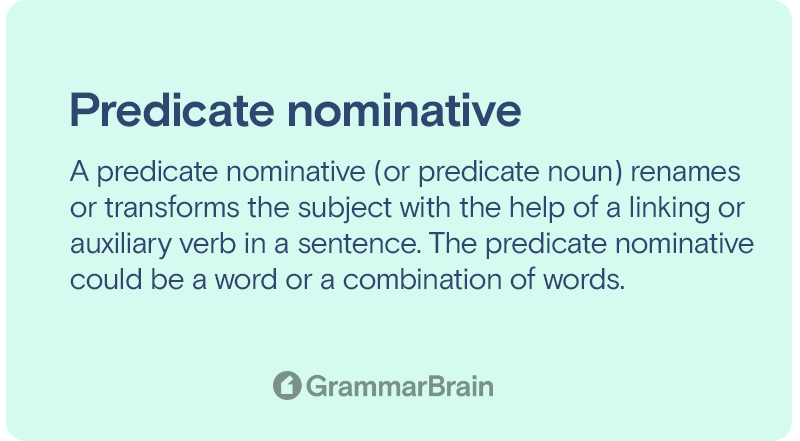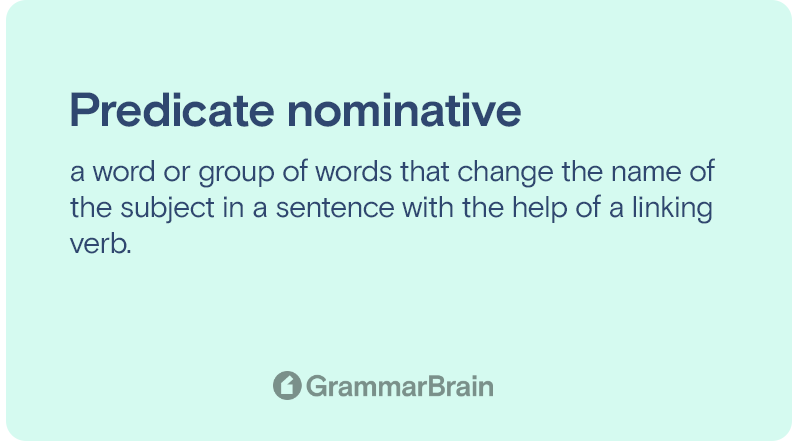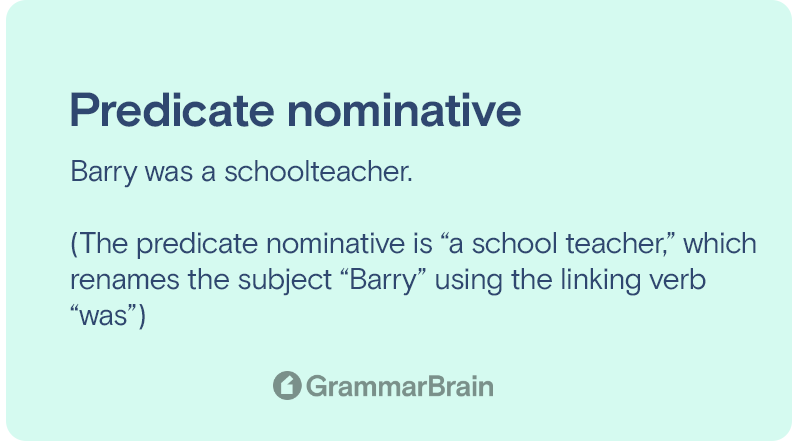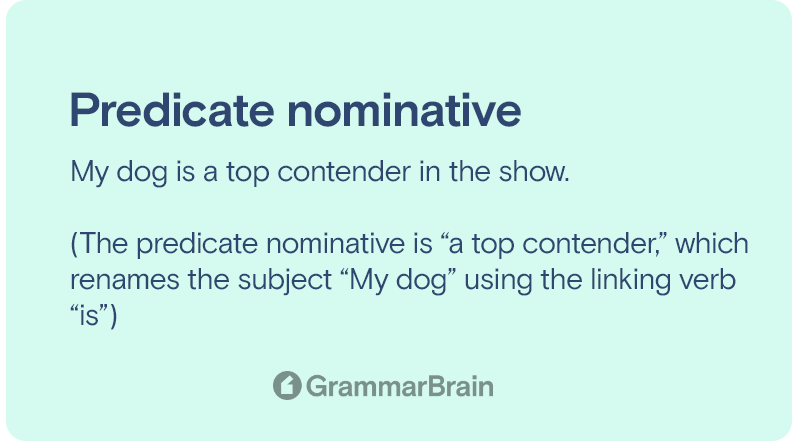What is a predicate nominative? How does a predicate nominative work? The grammar of any language is filled with rules and structures that enable us to speak clearly and express thoughts, notions, and concepts with clarity.
In this article, you will learn about the predicate nominative. Ready to jump in? Let’s go!

What is a Predicate Nominative?
A predicate nominative (or predicate noun) renames or transforms the subject with the help of a linking or auxiliary verb in a sentence. The predicate nominative could be a word or a combination of words.
Here is a quick rundown of all the terms used in the previous paragraph:
- Subject – The person, thing, or object which carries an action or whom the sentence is about. It can be a noun, pronoun, or even a group of words.
- Predicate – The second part of the sentence containing the verb and the object. It tells us something about the subject.
- Verb – The word which denotes action or state of being (linking verb, helping verb, common verbs).
- Object – The thing, person, or object on which the action is performed (direct object, indirect object).
- Linking verbs – Verbs that describe a subject, reveal its status, or equate it to the object.

Definition
Predicate Nominative – a word or group of words that change the name of the subject in a sentence with the help of a linking verb.
| Form | Definition |
| Predicate Nominative | a word in the nominative case that completes a copulative verb, such as son in the sentence Charlie is my son. |
| Simple Predicate Nominative | a predicate nominative that contains a single noun. |
| Compound Predicate Nominative | a predicate nominative containing multiple nouns. |
Read this example:
- Ron is the new ruler of the kingdom.
In this sentence, the subject is “Ron.” But Ron’s identity changes from “Ron” to “the new ruler.” How does this transition happen? It happens with the help of the linking verb “is.”
You can also express this sentence as – “Ron = new ruler.” It expresses the same thing.
So, the predicate nominative in this sentence is “the new ruler” because that is what “Ron” is changing into with the help of the verb “is.”

What is a predicate nominative pronoun?
A pronoun is one of the parts of speech that is used in place of nouns.
There are three main types of pronouns:
- First-person – I, Me (Singular) and We, Us (Plural)
- Second-person – You and Your
- Third-person – She, Her, Him, He, It (Singular) and Their, Them, They (Plural)
These are also known as personal pronouns, object pronouns, possessive pronouns, and more.
In the case of predicate nominative, pronouns act similarly to nouns since they serve as noun alternatives in a sentence.
Read this example:
- This is his own fault.
In this sentence, “This” is the subject while “he” is the pronoun. The pronoun renames the subject with the help of the linking verb “is.” So, “he” is the predicate nominative pronoun.

Examples of Predicate Nominatives
Here are some examples of predicate nominatives to help you understand the concept better –
- Barry was a schoolteacher.
(The predicate nominative is “a school teacher,” which renames the subject “Barry” using the linking verb “was”)
- My dog is a top contender in the show.
(The predicate nominative is “a top contender,” which renames the subject “My dog” using the linking verb “is”)
- Mary will be queen someday.
(The predicate nominative is “queen,” which renames the subject “Mary” using the linking verb “will be”)
- You could have been the new chairman.
(The predicate nominative is “the new chairman,” which renames the subject “You” using the linking verb “could have been.” Remember, even auxiliary verbs can form predicate nominatives.)
Predicate Nominative vs. Predicate Adjective
A predicate nominative is a pronoun or noun. That means it is a person, thing, place, emotion, etc. On the other hand, a predicate adjective is an adjective. It describes or adds more meaning to a noun.
Read these two examples for clarity:
- David is lovely.
- David is a lovely person.
In the first sentence, there is no object. The word “lovely” describes David’s personality. It does not rename the noun. So, here “lovely” is a predicate adjective.
In the second sentence, David changes to “a lovely person” using the verb “is”. So, here “a lovely person” is a predicate nominative.
What is a Compound Predicate Nominative?
A compound is a mixture of two or more elements. So a compound predicate nominative contains two or more nouns.
Read this example:
- Lara was a brave person and a beautiful soul.
Here, Lara is compared to “a brave person” and “a beautiful soul.” This makes “a brave person and a beautiful soul” a compound predicate nominative.
Why Are Predicate Nominatives Important?
Knowing about predicate nominatives can clear some common grammar confusion.
For example, many people say, “It was me.” But the correct expression is “It was I.” This is because predicate nominatives are used in the subjective case.
How to Identify a Predicate Nominative
A clear indication of predicate nominatives is linking verbs and the preceding subject.
The sentence should imply – Subject = Predicate Nominative.
When linking verbs are synonymous with “equals to,” the proceeding noun will be a predicate nominative.
FAQs
What are some examples of predicate pronouns?
Him, her, it, he, she, me, you, etc., are some predicate pronouns.
When is predicate pronoun used?
Predicate pronouns are used when you want to rename the subject using a linking verb.
How is a predicate pronoun different from the direct object?
A predicate pronoun equates the subject to itself (which is a noun). But a direct object is the noun on which the subject performs an action.
Is a predicate noun and predicate nominative the same?
Yes.
What are predicate adjectives?
Predicate adjectives typically complement the linking verbs be, become, make, or feel.
Inside this article
Fact checked:
Content is rigorously reviewed by a team of qualified and experienced fact checkers. Fact checkers review articles for factual accuracy, relevance, and timeliness. Learn more.
Core lessons
Glossary
- Abstract Noun
- Accusative Case
- Anecdote
- Antonym
- Active Sentence
- Adverb
- Adjective
- Allegory
- Alliteration
- Adjective Clause
- Adjective Phrase
- Ampersand
- Anastrophe
- Adverbial Clause
- Appositive Phrase
- Clause
- Compound Adjective
- Complex Sentence
- Compound Words
- Compound Predicate
- Common Noun
- Comparative Adjective
- Comparative and Superlative
- Compound Noun
- Compound Subject
- Compound Sentence
- Copular Verb
- Collective Noun
- Colloquialism
- Conciseness
- Consonance
- Conditional
- Concrete Noun
- Conjunction
- Conjugation
- Conditional Sentence
- Comma Splice
- Correlative Conjunction
- Coordinating Conjunction
- Coordinate Adjective
- Cumulative Adjective
- Dative Case
- Determiner
- Declarative Sentence
- Declarative Statement
- Direct Object Pronoun
- Direct Object
- Diction
- Diphthong
- Dangling Modifier
- Demonstrative Pronoun
- Demonstrative Adjective
- Direct Characterization
- Definite Article
- Doublespeak
- False Dilemma Fallacy
- Future Perfect Progressive
- Future Simple
- Future Perfect Continuous
- Future Perfect
- First Conditional
- Irregular Adjective
- Irregular Verb
- Imperative Sentence
- Indefinite Article
- Intransitive Verb
- Introductory Phrase
- Indefinite Pronoun
- Indirect Characterization
- Interrogative Sentence
- Intensive Pronoun
- Inanimate Object
- Indefinite Tense
- Infinitive Phrase
- Interjection
- Intensifier
- Infinitive
- Indicative Mood
- Participle
- Parallelism
- Prepositional Phrase
- Past Simple Tense
- Past Continuous Tense
- Past Perfect Tense
- Past Progressive Tense
- Present Simple Tense
- Present Perfect Tense
- Personal Pronoun
- Personification
- Persuasive Writing
- Parallel Structure
- Phrasal Verb
- Predicate Adjective
- Predicate Nominative
- Phonetic Language
- Plural Noun
- Punctuation
- Punctuation Marks
- Preposition
- Preposition of Place
- Parts of Speech
- Possessive Adjective
- Possessive Determiner
- Possessive Case
- Possessive Noun
- Proper Adjective
- Proper Noun
- Present Participle
- Prefix
- Predicate



